University Essay: PICT/PICX813 - History of Intelligence Analysis
VerifiedAdded on 2022/10/04
|9
|2208
|423
Essay
AI Summary
This essay delves into the history of intelligence, particularly focusing on the events leading up to and following the Iraq War. It examines the role of intelligence agencies like the CIA, the controversial claims of WMDs, and the political motivations behind the conflict. The essay analyzes the failures of intelligence gathering, the politicization of reports, and the impact of these issues on the war's outcome. It also explores the involvement of key figures such as Saddam Hussein, George W. Bush, and Tony Blair, while critiquing the validity of the intelligence reports and the subsequent investigations. The essay highlights the long-term consequences of these intelligence failures, including the rise of ISIS and the destabilization of the Middle East, ultimately questioning the ethics and effectiveness of intelligence operations.
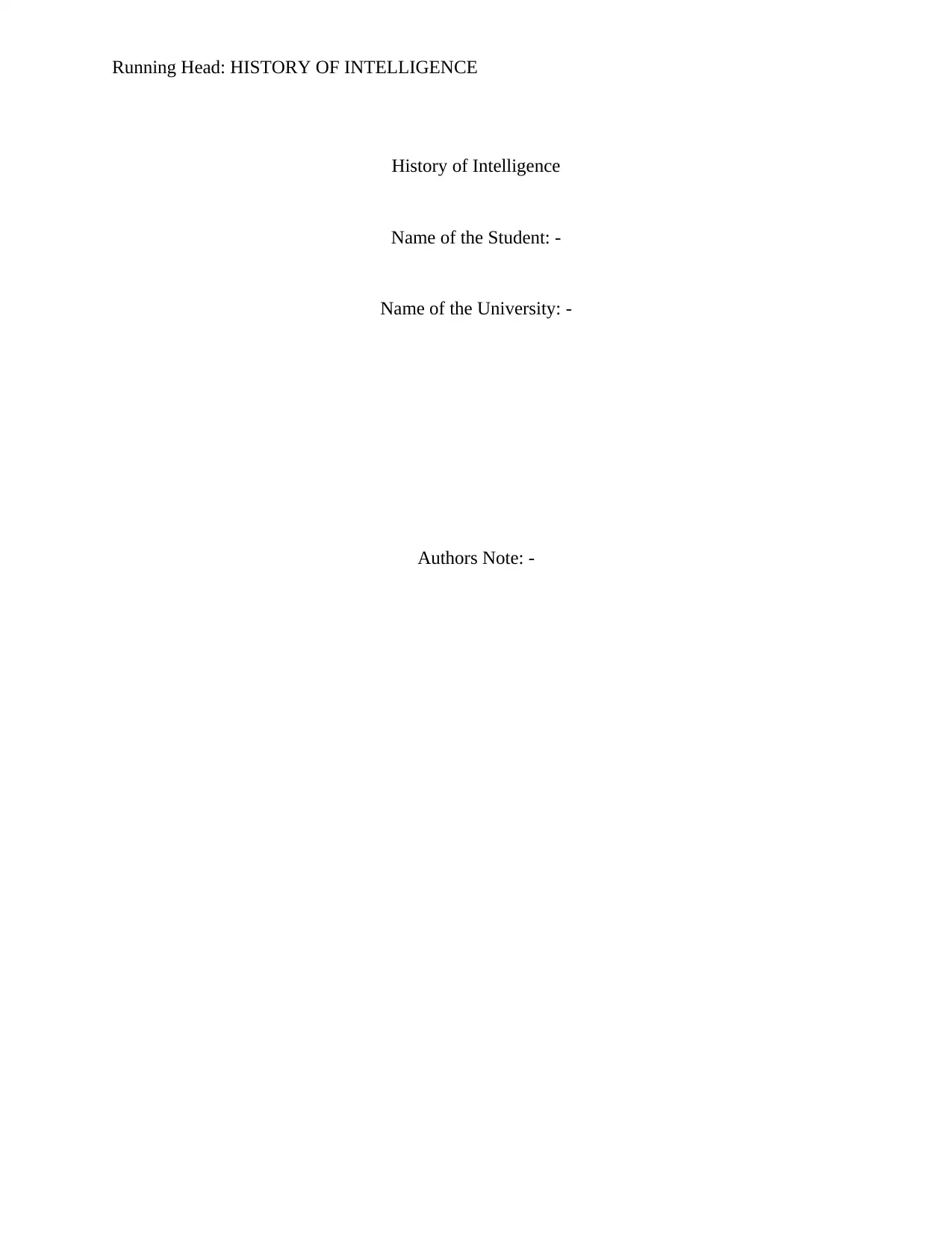
Running Head: HISTORY OF INTELLIGENCE
History of Intelligence
Name of the Student: -
Name of the University: -
Authors Note: -
History of Intelligence
Name of the Student: -
Name of the University: -
Authors Note: -
Secure Best Marks with AI Grader
Need help grading? Try our AI Grader for instant feedback on your assignments.
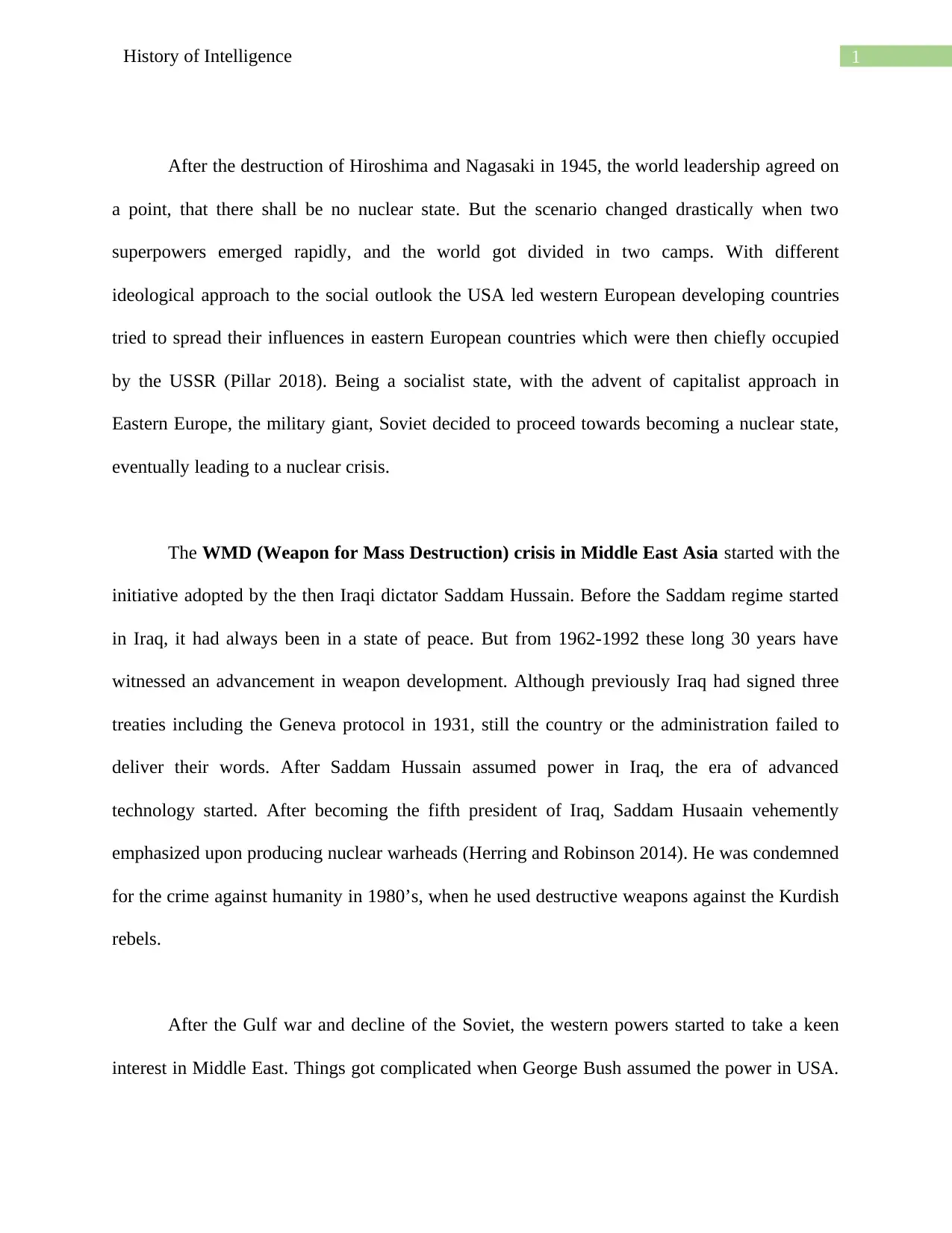
1History of Intelligence
After the destruction of Hiroshima and Nagasaki in 1945, the world leadership agreed on
a point, that there shall be no nuclear state. But the scenario changed drastically when two
superpowers emerged rapidly, and the world got divided in two camps. With different
ideological approach to the social outlook the USA led western European developing countries
tried to spread their influences in eastern European countries which were then chiefly occupied
by the USSR (Pillar 2018). Being a socialist state, with the advent of capitalist approach in
Eastern Europe, the military giant, Soviet decided to proceed towards becoming a nuclear state,
eventually leading to a nuclear crisis.
The WMD (Weapon for Mass Destruction) crisis in Middle East Asia started with the
initiative adopted by the then Iraqi dictator Saddam Hussain. Before the Saddam regime started
in Iraq, it had always been in a state of peace. But from 1962-1992 these long 30 years have
witnessed an advancement in weapon development. Although previously Iraq had signed three
treaties including the Geneva protocol in 1931, still the country or the administration failed to
deliver their words. After Saddam Hussain assumed power in Iraq, the era of advanced
technology started. After becoming the fifth president of Iraq, Saddam Husaain vehemently
emphasized upon producing nuclear warheads (Herring and Robinson 2014). He was condemned
for the crime against humanity in 1980’s, when he used destructive weapons against the Kurdish
rebels.
After the Gulf war and decline of the Soviet, the western powers started to take a keen
interest in Middle East. Things got complicated when George Bush assumed the power in USA.
After the destruction of Hiroshima and Nagasaki in 1945, the world leadership agreed on
a point, that there shall be no nuclear state. But the scenario changed drastically when two
superpowers emerged rapidly, and the world got divided in two camps. With different
ideological approach to the social outlook the USA led western European developing countries
tried to spread their influences in eastern European countries which were then chiefly occupied
by the USSR (Pillar 2018). Being a socialist state, with the advent of capitalist approach in
Eastern Europe, the military giant, Soviet decided to proceed towards becoming a nuclear state,
eventually leading to a nuclear crisis.
The WMD (Weapon for Mass Destruction) crisis in Middle East Asia started with the
initiative adopted by the then Iraqi dictator Saddam Hussain. Before the Saddam regime started
in Iraq, it had always been in a state of peace. But from 1962-1992 these long 30 years have
witnessed an advancement in weapon development. Although previously Iraq had signed three
treaties including the Geneva protocol in 1931, still the country or the administration failed to
deliver their words. After Saddam Hussain assumed power in Iraq, the era of advanced
technology started. After becoming the fifth president of Iraq, Saddam Husaain vehemently
emphasized upon producing nuclear warheads (Herring and Robinson 2014). He was condemned
for the crime against humanity in 1980’s, when he used destructive weapons against the Kurdish
rebels.
After the Gulf war and decline of the Soviet, the western powers started to take a keen
interest in Middle East. Things got complicated when George Bush assumed the power in USA.
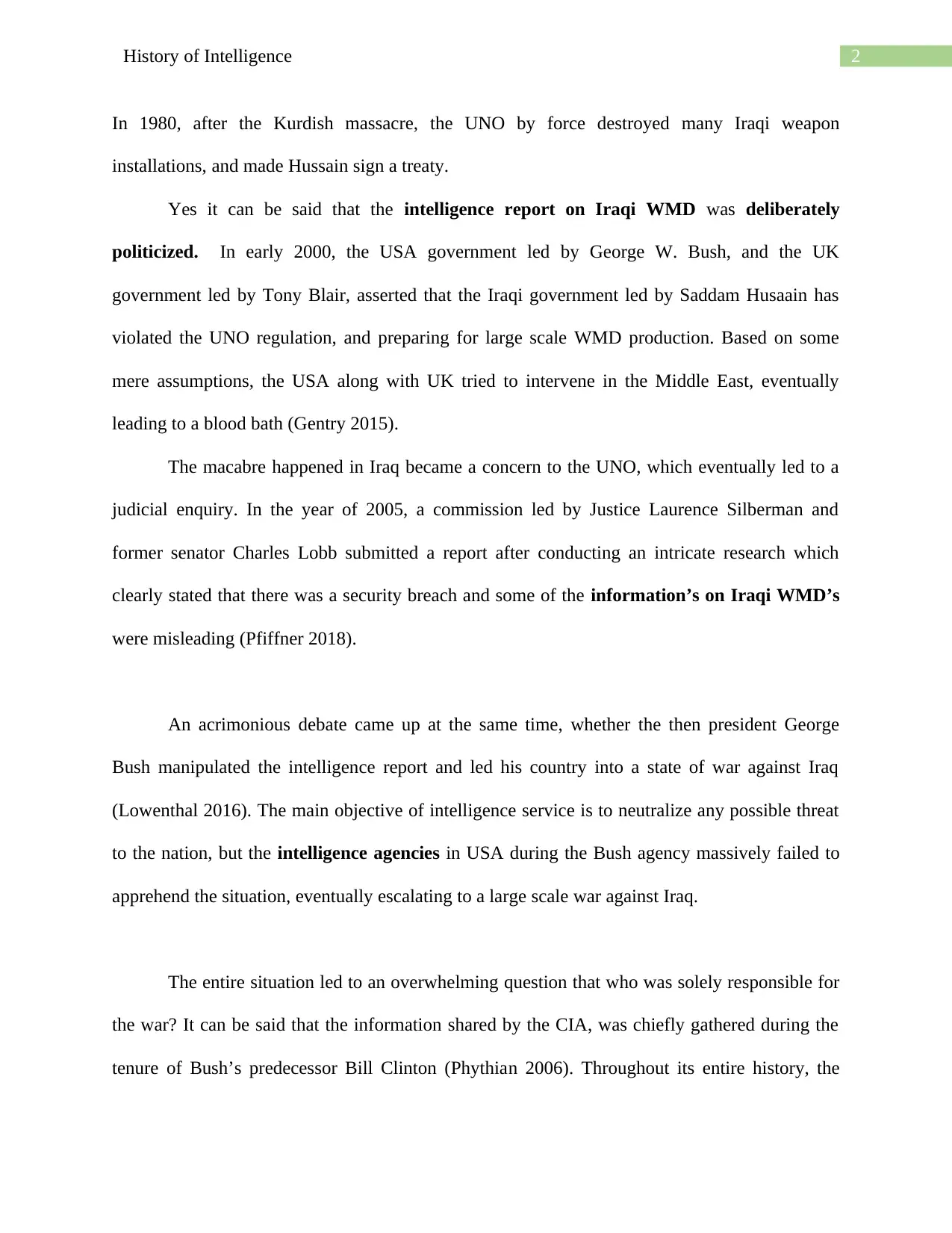
2History of Intelligence
In 1980, after the Kurdish massacre, the UNO by force destroyed many Iraqi weapon
installations, and made Hussain sign a treaty.
Yes it can be said that the intelligence report on Iraqi WMD was deliberately
politicized. In early 2000, the USA government led by George W. Bush, and the UK
government led by Tony Blair, asserted that the Iraqi government led by Saddam Husaain has
violated the UNO regulation, and preparing for large scale WMD production. Based on some
mere assumptions, the USA along with UK tried to intervene in the Middle East, eventually
leading to a blood bath (Gentry 2015).
The macabre happened in Iraq became a concern to the UNO, which eventually led to a
judicial enquiry. In the year of 2005, a commission led by Justice Laurence Silberman and
former senator Charles Lobb submitted a report after conducting an intricate research which
clearly stated that there was a security breach and some of the information’s on Iraqi WMD’s
were misleading (Pfiffner 2018).
An acrimonious debate came up at the same time, whether the then president George
Bush manipulated the intelligence report and led his country into a state of war against Iraq
(Lowenthal 2016). The main objective of intelligence service is to neutralize any possible threat
to the nation, but the intelligence agencies in USA during the Bush agency massively failed to
apprehend the situation, eventually escalating to a large scale war against Iraq.
The entire situation led to an overwhelming question that who was solely responsible for
the war? It can be said that the information shared by the CIA, was chiefly gathered during the
tenure of Bush’s predecessor Bill Clinton (Phythian 2006). Throughout its entire history, the
In 1980, after the Kurdish massacre, the UNO by force destroyed many Iraqi weapon
installations, and made Hussain sign a treaty.
Yes it can be said that the intelligence report on Iraqi WMD was deliberately
politicized. In early 2000, the USA government led by George W. Bush, and the UK
government led by Tony Blair, asserted that the Iraqi government led by Saddam Husaain has
violated the UNO regulation, and preparing for large scale WMD production. Based on some
mere assumptions, the USA along with UK tried to intervene in the Middle East, eventually
leading to a blood bath (Gentry 2015).
The macabre happened in Iraq became a concern to the UNO, which eventually led to a
judicial enquiry. In the year of 2005, a commission led by Justice Laurence Silberman and
former senator Charles Lobb submitted a report after conducting an intricate research which
clearly stated that there was a security breach and some of the information’s on Iraqi WMD’s
were misleading (Pfiffner 2018).
An acrimonious debate came up at the same time, whether the then president George
Bush manipulated the intelligence report and led his country into a state of war against Iraq
(Lowenthal 2016). The main objective of intelligence service is to neutralize any possible threat
to the nation, but the intelligence agencies in USA during the Bush agency massively failed to
apprehend the situation, eventually escalating to a large scale war against Iraq.
The entire situation led to an overwhelming question that who was solely responsible for
the war? It can be said that the information shared by the CIA, was chiefly gathered during the
tenure of Bush’s predecessor Bill Clinton (Phythian 2006). Throughout its entire history, the
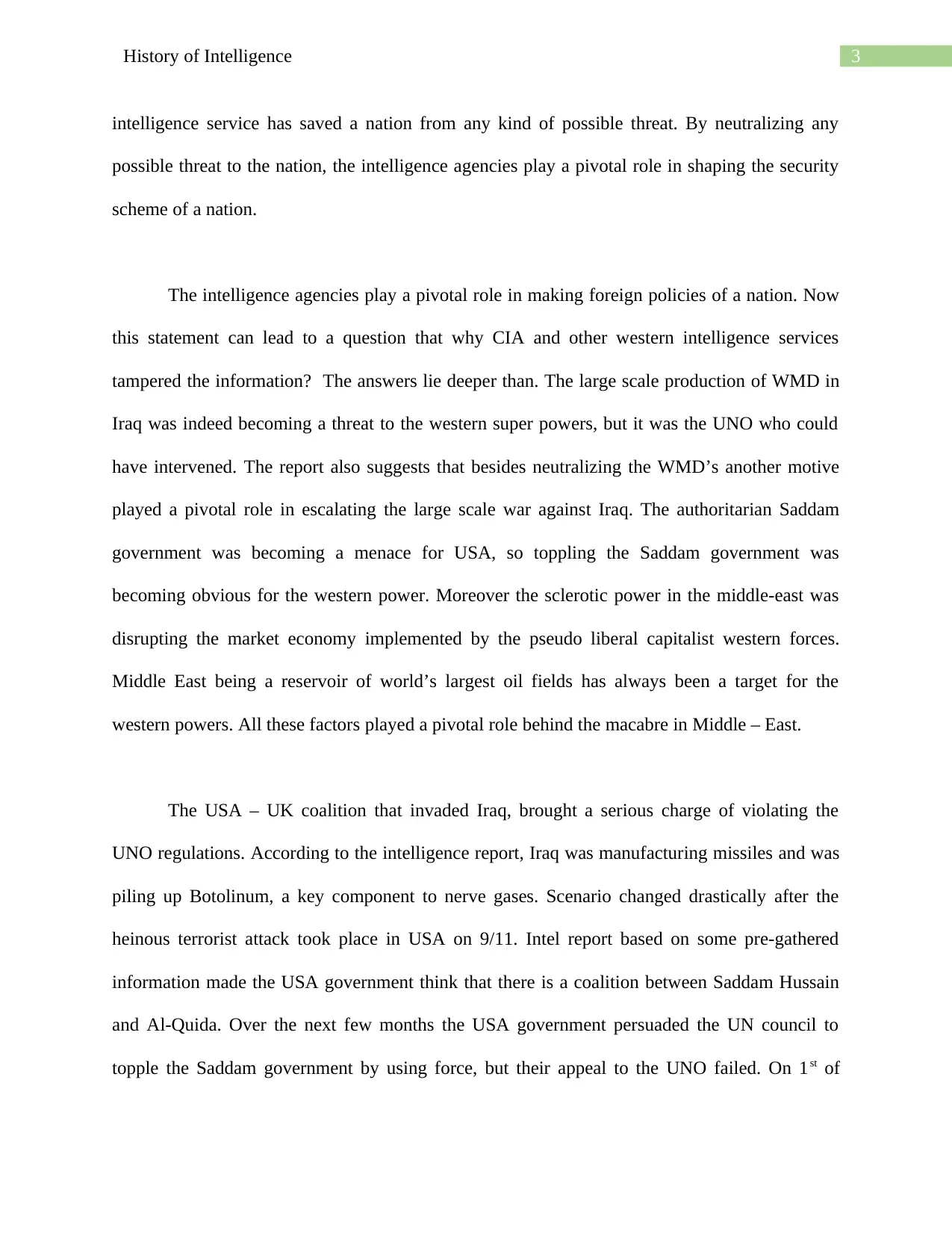
3History of Intelligence
intelligence service has saved a nation from any kind of possible threat. By neutralizing any
possible threat to the nation, the intelligence agencies play a pivotal role in shaping the security
scheme of a nation.
The intelligence agencies play a pivotal role in making foreign policies of a nation. Now
this statement can lead to a question that why CIA and other western intelligence services
tampered the information? The answers lie deeper than. The large scale production of WMD in
Iraq was indeed becoming a threat to the western super powers, but it was the UNO who could
have intervened. The report also suggests that besides neutralizing the WMD’s another motive
played a pivotal role in escalating the large scale war against Iraq. The authoritarian Saddam
government was becoming a menace for USA, so toppling the Saddam government was
becoming obvious for the western power. Moreover the sclerotic power in the middle-east was
disrupting the market economy implemented by the pseudo liberal capitalist western forces.
Middle East being a reservoir of world’s largest oil fields has always been a target for the
western powers. All these factors played a pivotal role behind the macabre in Middle – East.
The USA – UK coalition that invaded Iraq, brought a serious charge of violating the
UNO regulations. According to the intelligence report, Iraq was manufacturing missiles and was
piling up Botolinum, a key component to nerve gases. Scenario changed drastically after the
heinous terrorist attack took place in USA on 9/11. Intel report based on some pre-gathered
information made the USA government think that there is a coalition between Saddam Hussain
and Al-Quida. Over the next few months the USA government persuaded the UN council to
topple the Saddam government by using force, but their appeal to the UNO failed. On 1st of
intelligence service has saved a nation from any kind of possible threat. By neutralizing any
possible threat to the nation, the intelligence agencies play a pivotal role in shaping the security
scheme of a nation.
The intelligence agencies play a pivotal role in making foreign policies of a nation. Now
this statement can lead to a question that why CIA and other western intelligence services
tampered the information? The answers lie deeper than. The large scale production of WMD in
Iraq was indeed becoming a threat to the western super powers, but it was the UNO who could
have intervened. The report also suggests that besides neutralizing the WMD’s another motive
played a pivotal role in escalating the large scale war against Iraq. The authoritarian Saddam
government was becoming a menace for USA, so toppling the Saddam government was
becoming obvious for the western power. Moreover the sclerotic power in the middle-east was
disrupting the market economy implemented by the pseudo liberal capitalist western forces.
Middle East being a reservoir of world’s largest oil fields has always been a target for the
western powers. All these factors played a pivotal role behind the macabre in Middle – East.
The USA – UK coalition that invaded Iraq, brought a serious charge of violating the
UNO regulations. According to the intelligence report, Iraq was manufacturing missiles and was
piling up Botolinum, a key component to nerve gases. Scenario changed drastically after the
heinous terrorist attack took place in USA on 9/11. Intel report based on some pre-gathered
information made the USA government think that there is a coalition between Saddam Hussain
and Al-Quida. Over the next few months the USA government persuaded the UN council to
topple the Saddam government by using force, but their appeal to the UNO failed. On 1st of
Secure Best Marks with AI Grader
Need help grading? Try our AI Grader for instant feedback on your assignments.
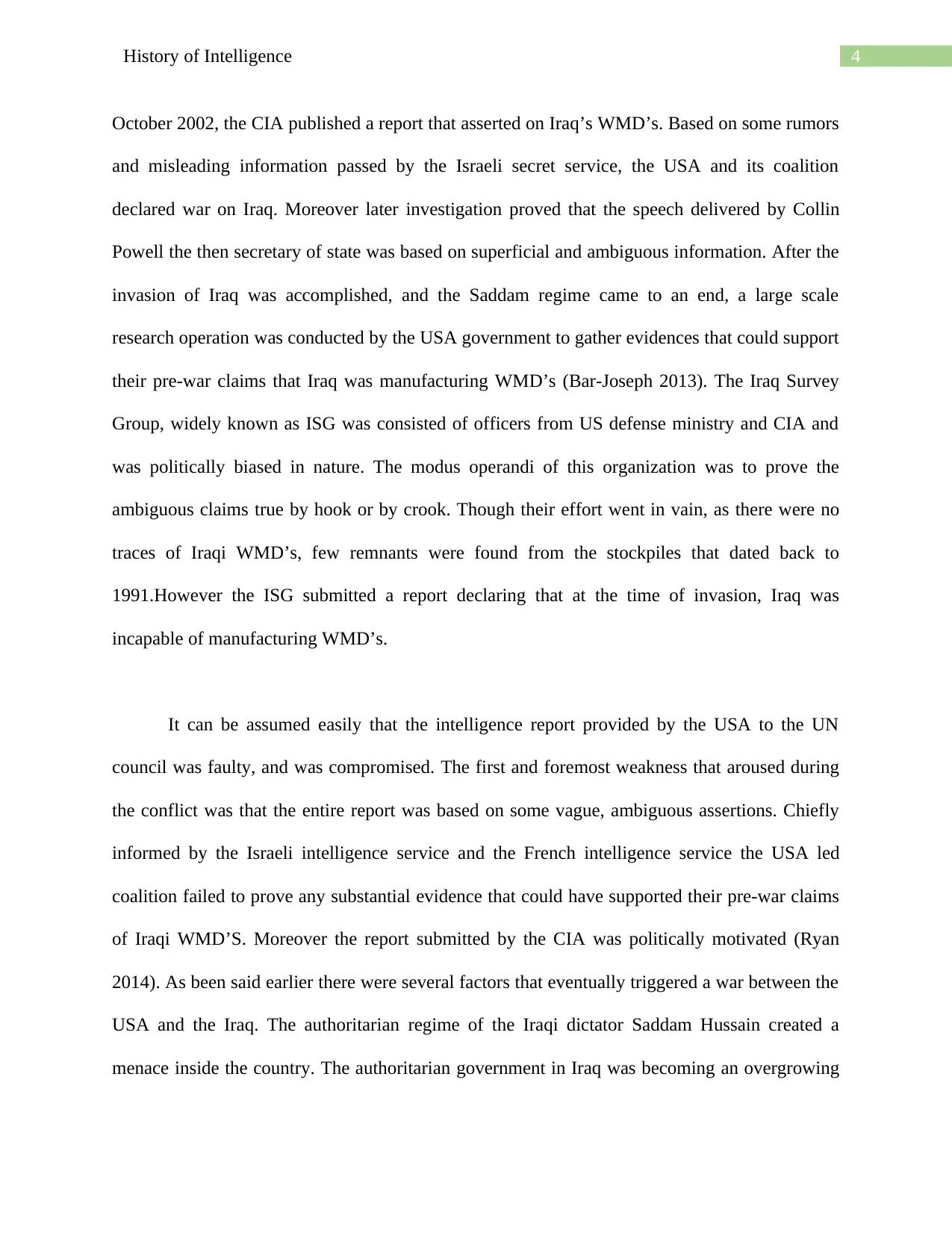
4History of Intelligence
October 2002, the CIA published a report that asserted on Iraq’s WMD’s. Based on some rumors
and misleading information passed by the Israeli secret service, the USA and its coalition
declared war on Iraq. Moreover later investigation proved that the speech delivered by Collin
Powell the then secretary of state was based on superficial and ambiguous information. After the
invasion of Iraq was accomplished, and the Saddam regime came to an end, a large scale
research operation was conducted by the USA government to gather evidences that could support
their pre-war claims that Iraq was manufacturing WMD’s (Bar-Joseph 2013). The Iraq Survey
Group, widely known as ISG was consisted of officers from US defense ministry and CIA and
was politically biased in nature. The modus operandi of this organization was to prove the
ambiguous claims true by hook or by crook. Though their effort went in vain, as there were no
traces of Iraqi WMD’s, few remnants were found from the stockpiles that dated back to
1991.However the ISG submitted a report declaring that at the time of invasion, Iraq was
incapable of manufacturing WMD’s.
It can be assumed easily that the intelligence report provided by the USA to the UN
council was faulty, and was compromised. The first and foremost weakness that aroused during
the conflict was that the entire report was based on some vague, ambiguous assertions. Chiefly
informed by the Israeli intelligence service and the French intelligence service the USA led
coalition failed to prove any substantial evidence that could have supported their pre-war claims
of Iraqi WMD’S. Moreover the report submitted by the CIA was politically motivated (Ryan
2014). As been said earlier there were several factors that eventually triggered a war between the
USA and the Iraq. The authoritarian regime of the Iraqi dictator Saddam Hussain created a
menace inside the country. The authoritarian government in Iraq was becoming an overgrowing
October 2002, the CIA published a report that asserted on Iraq’s WMD’s. Based on some rumors
and misleading information passed by the Israeli secret service, the USA and its coalition
declared war on Iraq. Moreover later investigation proved that the speech delivered by Collin
Powell the then secretary of state was based on superficial and ambiguous information. After the
invasion of Iraq was accomplished, and the Saddam regime came to an end, a large scale
research operation was conducted by the USA government to gather evidences that could support
their pre-war claims that Iraq was manufacturing WMD’s (Bar-Joseph 2013). The Iraq Survey
Group, widely known as ISG was consisted of officers from US defense ministry and CIA and
was politically biased in nature. The modus operandi of this organization was to prove the
ambiguous claims true by hook or by crook. Though their effort went in vain, as there were no
traces of Iraqi WMD’s, few remnants were found from the stockpiles that dated back to
1991.However the ISG submitted a report declaring that at the time of invasion, Iraq was
incapable of manufacturing WMD’s.
It can be assumed easily that the intelligence report provided by the USA to the UN
council was faulty, and was compromised. The first and foremost weakness that aroused during
the conflict was that the entire report was based on some vague, ambiguous assertions. Chiefly
informed by the Israeli intelligence service and the French intelligence service the USA led
coalition failed to prove any substantial evidence that could have supported their pre-war claims
of Iraqi WMD’S. Moreover the report submitted by the CIA was politically motivated (Ryan
2014). As been said earlier there were several factors that eventually triggered a war between the
USA and the Iraq. The authoritarian regime of the Iraqi dictator Saddam Hussain created a
menace inside the country. The authoritarian government in Iraq was becoming an overgrowing
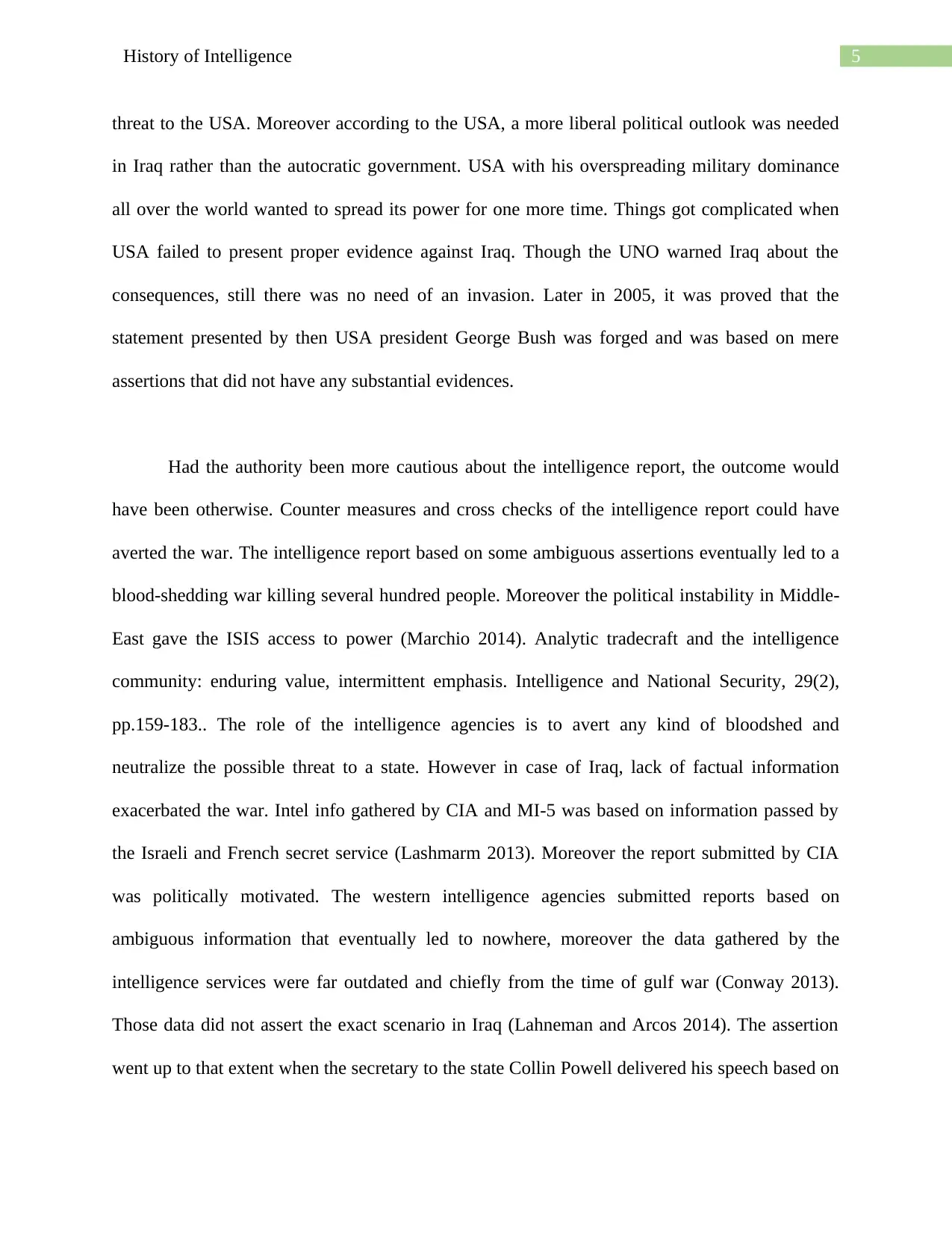
5History of Intelligence
threat to the USA. Moreover according to the USA, a more liberal political outlook was needed
in Iraq rather than the autocratic government. USA with his overspreading military dominance
all over the world wanted to spread its power for one more time. Things got complicated when
USA failed to present proper evidence against Iraq. Though the UNO warned Iraq about the
consequences, still there was no need of an invasion. Later in 2005, it was proved that the
statement presented by then USA president George Bush was forged and was based on mere
assertions that did not have any substantial evidences.
Had the authority been more cautious about the intelligence report, the outcome would
have been otherwise. Counter measures and cross checks of the intelligence report could have
averted the war. The intelligence report based on some ambiguous assertions eventually led to a
blood-shedding war killing several hundred people. Moreover the political instability in Middle-
East gave the ISIS access to power (Marchio 2014). Analytic tradecraft and the intelligence
community: enduring value, intermittent emphasis. Intelligence and National Security, 29(2),
pp.159-183.. The role of the intelligence agencies is to avert any kind of bloodshed and
neutralize the possible threat to a state. However in case of Iraq, lack of factual information
exacerbated the war. Intel info gathered by CIA and MI-5 was based on information passed by
the Israeli and French secret service (Lashmarm 2013). Moreover the report submitted by CIA
was politically motivated. The western intelligence agencies submitted reports based on
ambiguous information that eventually led to nowhere, moreover the data gathered by the
intelligence services were far outdated and chiefly from the time of gulf war (Conway 2013).
Those data did not assert the exact scenario in Iraq (Lahneman and Arcos 2014). The assertion
went up to that extent when the secretary to the state Collin Powell delivered his speech based on
threat to the USA. Moreover according to the USA, a more liberal political outlook was needed
in Iraq rather than the autocratic government. USA with his overspreading military dominance
all over the world wanted to spread its power for one more time. Things got complicated when
USA failed to present proper evidence against Iraq. Though the UNO warned Iraq about the
consequences, still there was no need of an invasion. Later in 2005, it was proved that the
statement presented by then USA president George Bush was forged and was based on mere
assertions that did not have any substantial evidences.
Had the authority been more cautious about the intelligence report, the outcome would
have been otherwise. Counter measures and cross checks of the intelligence report could have
averted the war. The intelligence report based on some ambiguous assertions eventually led to a
blood-shedding war killing several hundred people. Moreover the political instability in Middle-
East gave the ISIS access to power (Marchio 2014). Analytic tradecraft and the intelligence
community: enduring value, intermittent emphasis. Intelligence and National Security, 29(2),
pp.159-183.. The role of the intelligence agencies is to avert any kind of bloodshed and
neutralize the possible threat to a state. However in case of Iraq, lack of factual information
exacerbated the war. Intel info gathered by CIA and MI-5 was based on information passed by
the Israeli and French secret service (Lashmarm 2013). Moreover the report submitted by CIA
was politically motivated. The western intelligence agencies submitted reports based on
ambiguous information that eventually led to nowhere, moreover the data gathered by the
intelligence services were far outdated and chiefly from the time of gulf war (Conway 2013).
Those data did not assert the exact scenario in Iraq (Lahneman and Arcos 2014). The assertion
went up to that extent when the secretary to the state Collin Powell delivered his speech based on
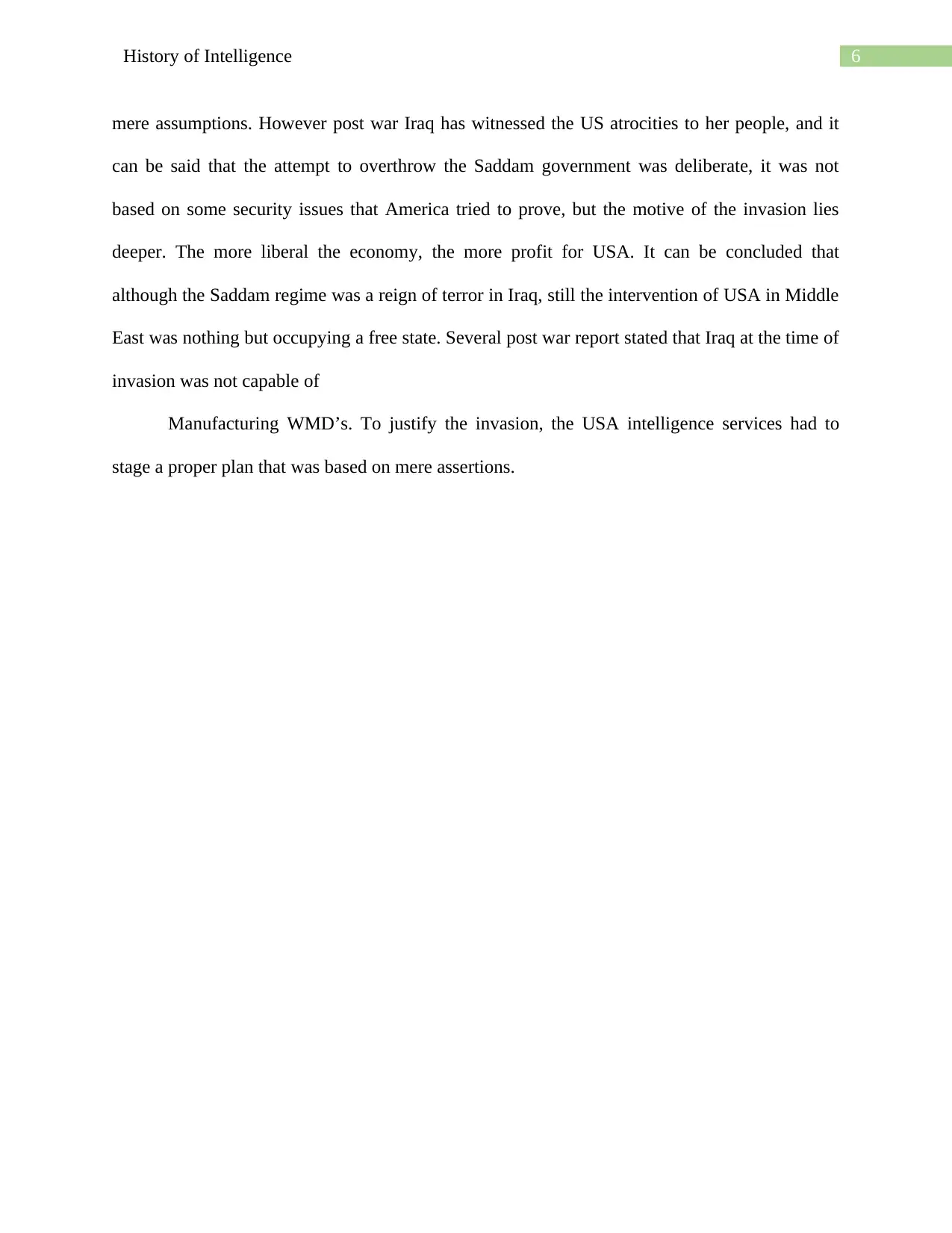
6History of Intelligence
mere assumptions. However post war Iraq has witnessed the US atrocities to her people, and it
can be said that the attempt to overthrow the Saddam government was deliberate, it was not
based on some security issues that America tried to prove, but the motive of the invasion lies
deeper. The more liberal the economy, the more profit for USA. It can be concluded that
although the Saddam regime was a reign of terror in Iraq, still the intervention of USA in Middle
East was nothing but occupying a free state. Several post war report stated that Iraq at the time of
invasion was not capable of
Manufacturing WMD’s. To justify the invasion, the USA intelligence services had to
stage a proper plan that was based on mere assertions.
mere assumptions. However post war Iraq has witnessed the US atrocities to her people, and it
can be said that the attempt to overthrow the Saddam government was deliberate, it was not
based on some security issues that America tried to prove, but the motive of the invasion lies
deeper. The more liberal the economy, the more profit for USA. It can be concluded that
although the Saddam regime was a reign of terror in Iraq, still the intervention of USA in Middle
East was nothing but occupying a free state. Several post war report stated that Iraq at the time of
invasion was not capable of
Manufacturing WMD’s. To justify the invasion, the USA intelligence services had to
stage a proper plan that was based on mere assertions.
Paraphrase This Document
Need a fresh take? Get an instant paraphrase of this document with our AI Paraphraser
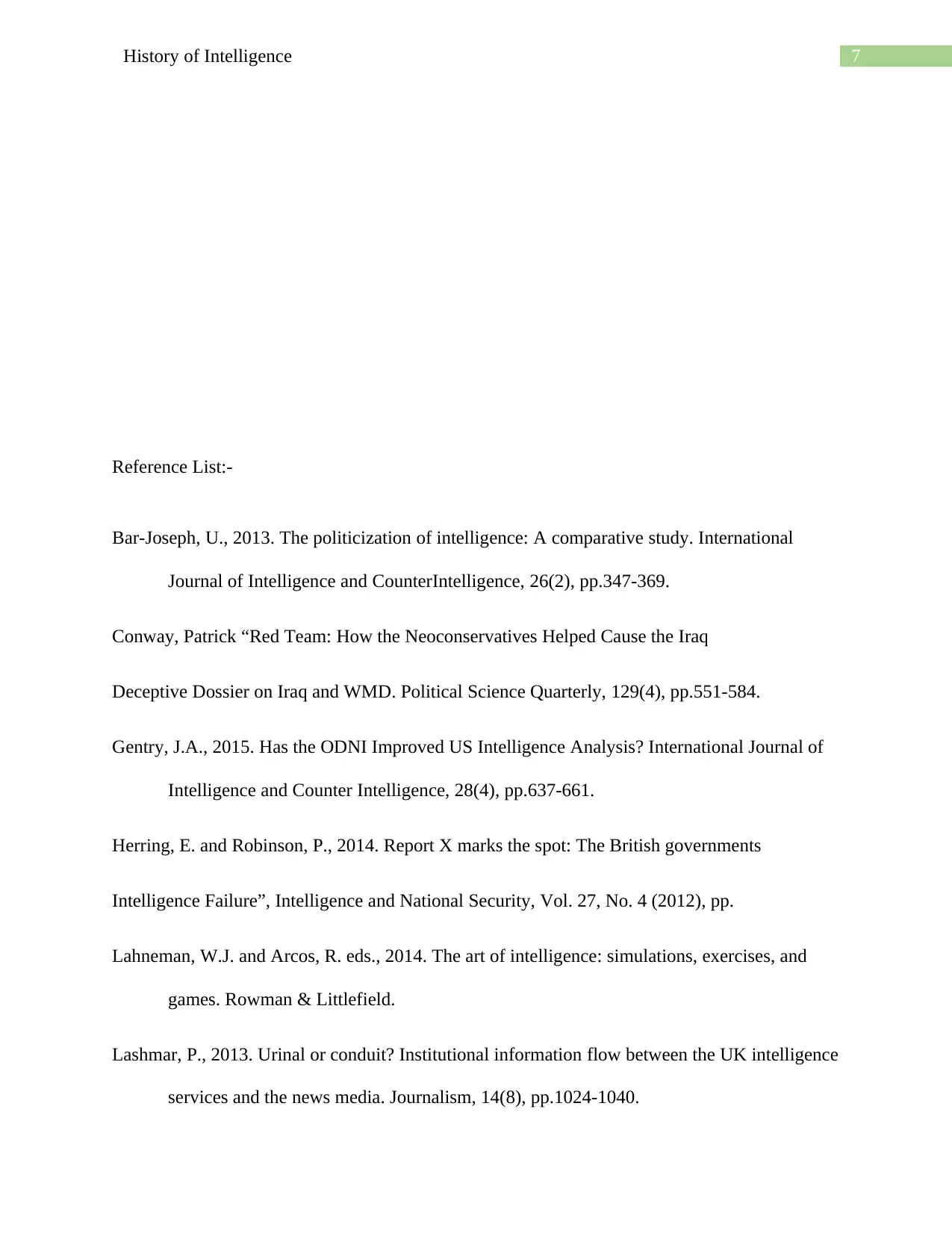
7History of Intelligence
Reference List:-
Bar-Joseph, U., 2013. The politicization of intelligence: A comparative study. International
Journal of Intelligence and CounterIntelligence, 26(2), pp.347-369.
Conway, Patrick “Red Team: How the Neoconservatives Helped Cause the Iraq
Deceptive Dossier on Iraq and WMD. Political Science Quarterly, 129(4), pp.551-584.
Gentry, J.A., 2015. Has the ODNI Improved US Intelligence Analysis? International Journal of
Intelligence and Counter Intelligence, 28(4), pp.637-661.
Herring, E. and Robinson, P., 2014. Report X marks the spot: The British governments
Intelligence Failure”, Intelligence and National Security, Vol. 27, No. 4 (2012), pp.
Lahneman, W.J. and Arcos, R. eds., 2014. The art of intelligence: simulations, exercises, and
games. Rowman & Littlefield.
Lashmar, P., 2013. Urinal or conduit? Institutional information flow between the UK intelligence
services and the news media. Journalism, 14(8), pp.1024-1040.
Reference List:-
Bar-Joseph, U., 2013. The politicization of intelligence: A comparative study. International
Journal of Intelligence and CounterIntelligence, 26(2), pp.347-369.
Conway, Patrick “Red Team: How the Neoconservatives Helped Cause the Iraq
Deceptive Dossier on Iraq and WMD. Political Science Quarterly, 129(4), pp.551-584.
Gentry, J.A., 2015. Has the ODNI Improved US Intelligence Analysis? International Journal of
Intelligence and Counter Intelligence, 28(4), pp.637-661.
Herring, E. and Robinson, P., 2014. Report X marks the spot: The British governments
Intelligence Failure”, Intelligence and National Security, Vol. 27, No. 4 (2012), pp.
Lahneman, W.J. and Arcos, R. eds., 2014. The art of intelligence: simulations, exercises, and
games. Rowman & Littlefield.
Lashmar, P., 2013. Urinal or conduit? Institutional information flow between the UK intelligence
services and the news media. Journalism, 14(8), pp.1024-1040.
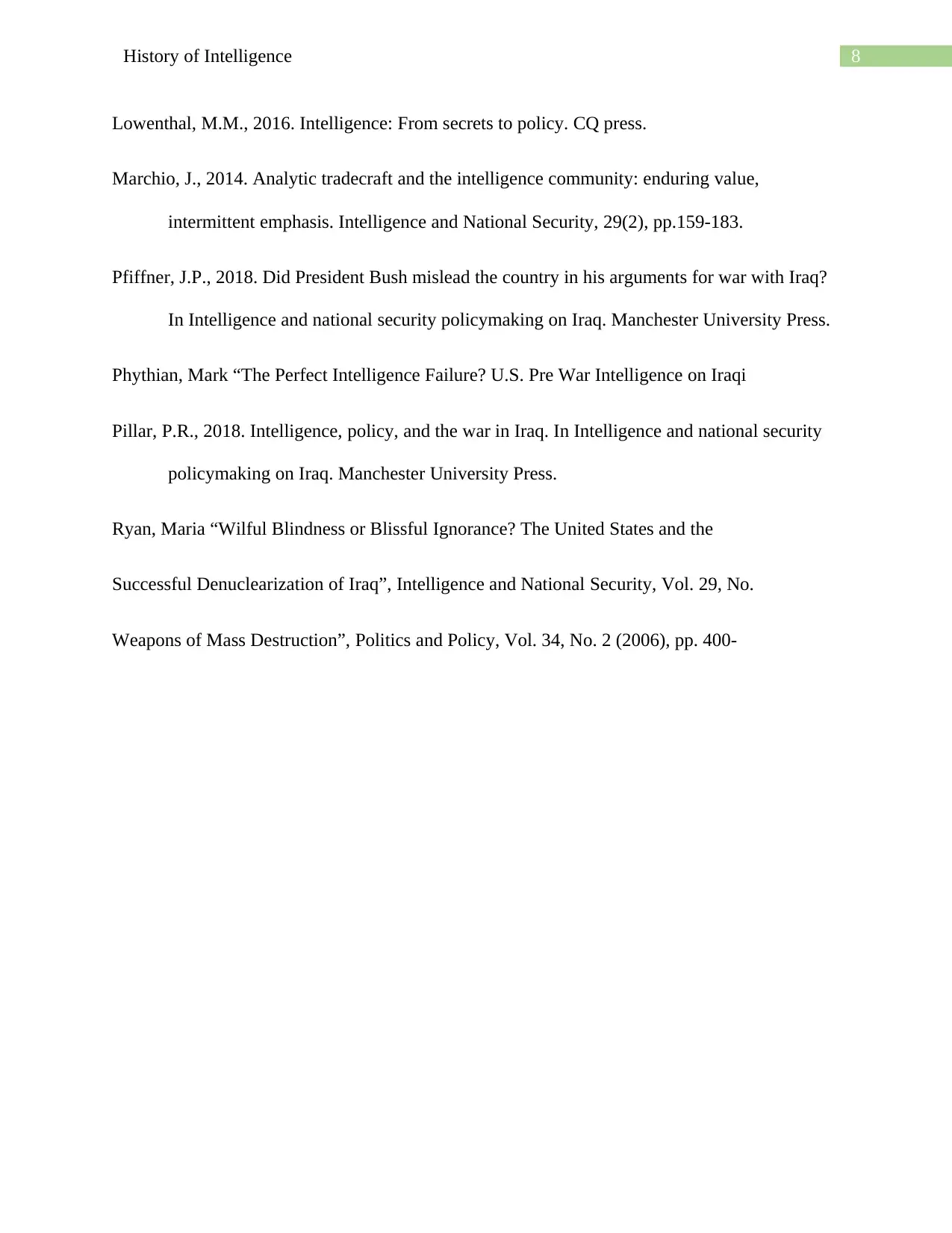
8History of Intelligence
Lowenthal, M.M., 2016. Intelligence: From secrets to policy. CQ press.
Marchio, J., 2014. Analytic tradecraft and the intelligence community: enduring value,
intermittent emphasis. Intelligence and National Security, 29(2), pp.159-183.
Pfiffner, J.P., 2018. Did President Bush mislead the country in his arguments for war with Iraq?
In Intelligence and national security policymaking on Iraq. Manchester University Press.
Phythian, Mark “The Perfect Intelligence Failure? U.S. Pre War Intelligence on Iraqi
Pillar, P.R., 2018. Intelligence, policy, and the war in Iraq. In Intelligence and national security
policymaking on Iraq. Manchester University Press.
Ryan, Maria “Wilful Blindness or Blissful Ignorance? The United States and the
Successful Denuclearization of Iraq”, Intelligence and National Security, Vol. 29, No.
Weapons of Mass Destruction”, Politics and Policy, Vol. 34, No. 2 (2006), pp. 400-
Lowenthal, M.M., 2016. Intelligence: From secrets to policy. CQ press.
Marchio, J., 2014. Analytic tradecraft and the intelligence community: enduring value,
intermittent emphasis. Intelligence and National Security, 29(2), pp.159-183.
Pfiffner, J.P., 2018. Did President Bush mislead the country in his arguments for war with Iraq?
In Intelligence and national security policymaking on Iraq. Manchester University Press.
Phythian, Mark “The Perfect Intelligence Failure? U.S. Pre War Intelligence on Iraqi
Pillar, P.R., 2018. Intelligence, policy, and the war in Iraq. In Intelligence and national security
policymaking on Iraq. Manchester University Press.
Ryan, Maria “Wilful Blindness or Blissful Ignorance? The United States and the
Successful Denuclearization of Iraq”, Intelligence and National Security, Vol. 29, No.
Weapons of Mass Destruction”, Politics and Policy, Vol. 34, No. 2 (2006), pp. 400-
1 out of 9
Your All-in-One AI-Powered Toolkit for Academic Success.
+13062052269
info@desklib.com
Available 24*7 on WhatsApp / Email
![[object Object]](/_next/static/media/star-bottom.7253800d.svg)
Unlock your academic potential
© 2024 | Zucol Services PVT LTD | All rights reserved.


